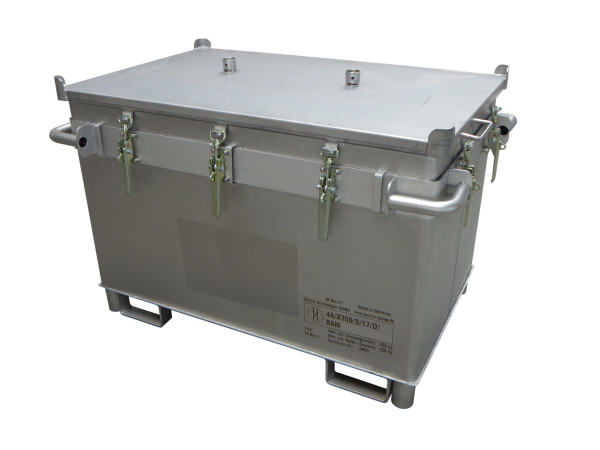
- Article no: GENVG1MX1CL

Questions about the article?
Our staff member Petra Fürbeck is happy to help you:
+49 (0) 7151 - 256 4817 or info@lion-care.com
| Max. Battery size: | 776 x 376 x 350 mm (LxWxH) |
| Empty weight: | 115 kg |
| max. net dangerous goods mass: | 200 kg |
| max. gross mass: | 430 kg |
| Handling the filling material: | Backfill |
| Material name: | Stainless steel (1.4301 (IIIc) 2B) |
| Volume: | 463 l |
| Packaging group: | Packaging group I |
| Packaging instructions according to ADR: | PI 908, PI 909, PI 910, PI 911 |
| ADR special provision: | SP 310, SP 376 |
| Areas of application: | Prototypes, critically defective batteries, Transport of rechargeable batteries, Transportation |
| External dimensions: | 1200 x 800 x 812 mm (LxWxH) |
| Filling material: | PyroBubbles® |
| Internal dimensions: | 1076 x 676 x 650 mm (LxWxH) |
The Lio Guard M-Box X1 stainless steel transport container presented here is the ideal solution for users who are looking for a reliable way to transport or store lithium batteries / lithium-ion batteries in accordance with the UN3090, UN3091, UN3480, UN3481 regulations and the latest standards. In addition to intact lithium batteries, the Lio Guard M-Box X1 transport container is particularly suitable for severely damaged cells, which represent a significant source of danger both during transportation and storage.
The battery transport container presented here is also available in a hot-dip galvanized steel version, which would be available on request. Please contact us for more information: info@lion-care.com or +49 7151 256 4811
This article is a production item. Before placing an order, it must also be checked whether the container is suitable for your specific lithium-ion battery. Please contact us for an individual offer including delivery time.
Size and capacity of the battery transport container
The Lio Guard M-Box X1 transport container for defective lithium batteries has a volume of 463 liters and can hold a hazardous goods quantity of 200 kg with a maximum size of 776 x 376 x 350 mm (LxWxH). The maximum gross weight is 430 kg. This is the smaller of the two medium-sized versions in the Lio Guard stainless steel transport container range. The Lio Guard M-Box X1 transport and storage container has external dimensions of 1200 x 800 x 812 mm and internal dimensions of 1076 x 676 x 650 mm (length x width x height). Industrial trucks can also drive under the container from all sides. In addition, the boxes can also be stacked for storage and therefore take up minimal storage space.
A coordinated system through the use of PyroBubbles®
Individual and expensive transport solutions can be replaced by using this economical and standardized product. The box has two safety valves and is filled with the fire protection agent PyroBubbles® , which forms a closed and thermally insulating layer around a fire source. This version of the box comes with 10 bags of 12.5 kg each for filling. Even in the event of a chain reaction (thermal runaway), the surrounding area can be reliably protected. Should this nevertheless occur, the temperature of the outer walls remains well below 100°C.
Innovative, reliable and safe
Years of development work have made these boxes one of the safest transport and storage options on the market. The surface of the boxes is highly porous, which means that vapors and liquids (electrolytes) are trapped. The formation of ignitable mixtures is prevented and the high heat capacity helps to cool reaction gases to near ambient temperature. In addition, the low thermal conductivity can isolate a cell fire and prevent it from spreading.
Certification and guidelines
Lithium batteries fall into dangerous goods class 9, which means that the goods pose a risk to the environment during transportation that should not be underestimated. Numerous specifications and guidelines must therefore be observed when transporting lithium batteries. The transport boxes in the Lio Guard series have been specially designed to meet the strictest safety regulations.
Certified for packaging group I
The containers in the Lio Guard series meet the requirements of packaging group I, which means that substances with a high hazard potential may be transported in them. To achieve this classification, many test requirements must be met. These include, for example, various drop tests from a height of 1.8 m. All packaging with the code "X" may be used for packaging groups I (II and III).
Meets the guidelines of SV 376 of the ADR and packaging instruction P 911 or LP 906
All lithium-ion cells or batteries and lithium-metal cells or batteries that have been damaged and no longer comply with the applicable regulations according to their manual must comply with the provisions of this special provision. This applies, for example, to cells that have leaked or degassed, have suffered external or mechanical damage or have been identified as defective for safety reasons or could no longer be diagnosed prior to transportation. If it is determined that the lithium-ion cells or batteries could be prone to rapid decomposition, dangerous reaction, flame generation, dangerous heat generation or dangerous emission of toxic, corrosive or flammable gases or vapors under normal transport conditions, these defective cells must then be transported in accordance with packing instruction P 911 or LP 906. These packaging guidelines in turn prescribe packaging group I.
The maximum energy density of the container (stainless steel) is 8,10 kWh (NMC).
The maximum energy density of the container (hot-dip galvanized steel) is 7,39 kWh (NMC).
The surface of the package must never exceed 100°C, only short-term temperature peaks of up to 200°C are permitted. No flames may form outside the package and no splinters may escape from the package. Furthermore, the structure of the package must be maintained at all times and a gas management system must ensure the safety of the boxes. Safety is confirmed by the Federal Institute for Materials Research and Testing (BAM) on the basis of real tests.
If the box is to be used for the transportation of "critical" lithium-ion batteries, further criteria such as cell chemistry, cell geometry etc. apply in accordance with the procedural specifications of the Federal Institute for Materials Research and Testing. Please contact us for further information: info@lion-care.com or +49 7151 256 4811.
Also for packaging instruction P908 (non-critical), P909 (end of line) and P910 (prototypes) according to SV 310, SV 376, SV 377
Of course, it is also possible to use this system to transport (non-critical) defective lithium batteries in accordance with P908 and prototypes in accordance with probe regulation SV 310 and packaging instruction P 910. Please contact us if required.
Future-oriented
Lithium-ion batteries will be indispensable in all industrial applications in the coming years. However, if used improperly, batteries can pose a potential hazard during production, storage and transportation that should not be underestimated. By purchasing these boxes, you protect yourself against major financial losses right from the start. International customers from the automotive and energy supply sectors, among others, rely on this proven technology.
In use for you
If you have any questions, please do not hesitate to contact us. We look forward to hearing from you!
| Suitable for critically defective?: | Yes |
| Max. Battery size: | 776 x 376 x 350 mm (LxWxH) |
| Type of packaging: | Dangerous goods packaging < 450 liters or < 400 kg net |
| Empty weight: | 115 kg |
| max. net dangerous goods mass: | 200 kg |
| max. gross mass: | 430 kg |
| Handling the filling material: | Backfill |
| Volume: | 84 - 600 l |
| Filling material supplied: | PyroBubbles® (bulk material) |
| Material: | Steel |
| Coding: | 4A |
| Material name: | Stainless steel (1.4301 (IIIc) 2B) |
| Volume: | 463 l |
| Packaging group: | Packaging group I |
| Packaging instructions according to ADR: | PI 908, PI 909, PI 910, PI 911 |
| ADR special provision: | SP 310, SP 376 |
| Areas of application: | Prototypes, critically defective batteries, Transport of rechargeable batteries, Transportation |
| External dimensions: | 1200 x 800 x 812 mm (LxWxH) |
| Filling material: | PyroBubbles® |
| Internal dimensions: | 1076 x 676 x 650 mm (LxWxH) |
Instructions for packing a battery in a GENIUS Lio Guard transport container
Fire test outdoors vs. in a Lio Guard transport container
That depends on various factors that need to be considered:
- size of the battery(ies)
- condition (e.g. non-critical, defective, critically defective or prototype)
- power
Transport boxes are available in many different sizes and specifications. The packaging group for which the box is suitable is indicated for each product.
Find out more in our blog article:
https://www.lion-care.com/aktuelles/blog/transportvorschriften-regeln-und-sicherheitsmassnahmen
Even if the batteries are not critical, remember to protect them from shocks and to order appropriate filling material if it is not already included in the box.
Yes. Should a battery reach a critical state and cause a fire, separating the batteries will prevent the fire from spreading and multiplying.
Generally, the insulation and protection material should line all sides of the container. The batteries are stored between individual layers.
We also have containers in our program that already have the protective material integrated into the outer wall. No further protective layer is necessary here.
The technical principles for storage and transportation solutions are very similar. The transport boxes are also subjected to extensive tests in accordance with ADR (drop test, fire test, etc.) to confirm compliance with the ADR regulations. The packaging regulations are extensive and regulated by law.
There are currently no comparable regulations for storage. Nevertheless, manufacturers of storage boxes regularly carry out appropriate tests.
The right container depends on the type and size of the battery to be shipped or stored.
If you want to learn more about battery storage and transportation, you will find the answers in our blog articles:
https://www.lion-care.com/aktuelles/blog/transportvorschriften-regeln-und-sicherheitsmassnahmen
https://www.lion-care.com/aktuelles/blog/lithium-ionen-akkus-sicherer-umgang-und-richtige-lagerung
The transportation of batteries is subject to ADR regulations.
The number, size and weight, energy density and condition of the batteries are crucial parameters for finding a suitable transport container for lithium-ion batteries. The selection process is complex and should be carried out by appropriately trained personnel. We have a trained hazardous materials officer on our team. Please feel free to contact us.
Plastic containers are cheaper but not as durable as metal containers. They are suitable, for example, for non-critical batteries, defective batteries, prototypes and end-of-life batteries. They can be used for both storage and transportation.
Metal containers are required, for example, when dealing with critically defective batteries.
The exact packaging instructions for these cases can be found in the ADR or by consulting a certified hazardous materials specialist.
To date, there are no legal requirements for the storage of lithium-ion batteries, which does not mean that they should be stored without suitable protective measures.
It is best to check with your insurer to find out which measures they recognize as suitable in the event of a claim.
For example, a suitable box could already be recognized as spatial separation.
A rough overview can be found in this VDS publication from the GDV:
https://shop. vds.de/download/vds-3103/ccb1d439-ad9d-47cb-a2b1-ace23e155610
Please also read our blog article on this topic:
https://www.lion-care.com/aktuelles/blog/lithium-ionen-akkus-sicherer-umgang-und-richtige-lagerung

